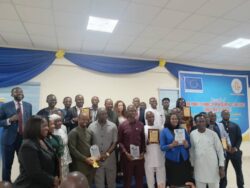Vice President Dr. Mahamudu Bawumia has admonished banks and key stakeholders in the financing space to reconsider their perceived notion that agricultural financing is too risky, thus their hesitation to invest in it.
Dr. Bawumia observed that agricultural financing is limited because financial institutions perceive it as a highly risky venture, and as such financial institutions are unable to develop suitable agricultural lending packages due to risk perceptions, adding: “There is substantial evidence that next to availability of water, financing is one of the major bottlenecks undermining full development of the country’s agricultural potential”.
He said the prevailing traditional path of lending schemes in the country is inimical to the efforts aimed at achieving the vision of self-reliance and shared prosperity – stressing the need for innovative schemes, bold steps and fit-for-purpose lending tools and instruments to support agriculture.
“With the realisation that the best pathway to sustainable growth and development is through agriculture, government is therefore committed to creating the enabling environment to generate the needed confidence for farmers and financing institutions to increase financial resources-flow into the agriculture sector. Government will continue its role as a catalyst for ensuring a stable financial environment in a sound macroeconomic environment to promote investment.
“The least government can do is to remove uncertainties in the macroeconomic environment by reducing inflation, lowering lending rates and delivering a stable exchange rate. Government through digitalisation is trying to create a better lending environment for financial institutions, hence interventions like the National ID system, National digital address system and mobile money interoperability,” he said.
The Vice President made these remarks during a virtual launch of the Feed the Future Ghana Mobilising Finance in Agriculture (MFA) activity by the USAID. MFA – spanning 2020-2024 – is a US$19million project seeking to facilitate transactions so as to increase agricultural finance in selected commodity value chains.
The project will leverage performance-based incentives to enhance the capacity of business advisory service providers to close deals and catalyse financial institutions’ engagement with the target segment. The targetted areas are the value chains of maize, cowpea, groundnut, soy, mango, cashew, shea and other high value export commodities.
The MFA seeks to unlock about US$261million in investment, in addition to spurring agricultural finance market behaviour-change and system reform to drive sustainable agricultural lending and inclusive growth.
Dr. Bawumia noted that the project’s theme, ‘Financing Ghana’s agriculture: a critical pathway toward sustainable growth, self-reliance and shared prosperity’, resonates with government’s vision of a ‘Ghana Beyond Aid’. He therefore commended USAID for such a creative solution to mobilising finance in agriculture and other initiatives to help transform the country’s agricultural ecosystem.
The US Ambassador to Ghana, Stephanie Sullivan, reaffirmed the US government’s commitment to assisting Ghana achieve greater self-reliance by helping businesses reap higher revenues, and strengthening bilateral trade between them. She entreated agribusiness owners, business advisors, farmers and financial institutions to take advantage of MFA to achieve the desired growth as well as contribute to national development.
The Minister for Food and Agriculture, Dr. Owusu Afriyie Akoto, in a speech read for him stated that key agricultural issues, including access to finance and investment, cannot be addressed exclusively by government – indicating that “They require consistent private sector engagement to unlock investments, drive exports, create jobs and transform the agricultural sector for it to play its rightful role in Ghana’s development agenda”.
On his part, Dr. Victor Antwi, Chief of Party- Feed the Future Ghana MFA who gave the overview of the project underscored its importance to the country’s economic growth and development, especially in an era where all hands must be on deck to alleviate the country from the shackle of coronomics.
He explained that MFA will provide training, technical assistance and pipeline development support to financial service providers to enable them to effectively serve agribusinesses. He indicated that 81,493 MSMEs will be supported to access financing while ten (10) new loan products will be developed by partner financial service providers.










